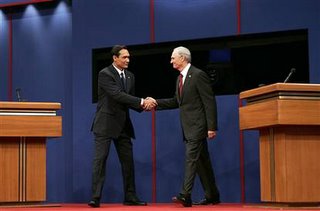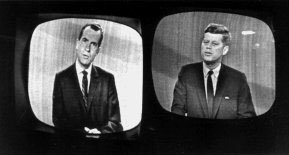The Making of the President 2008, take 1?
Just for a moment, as you watched the two politicians prowling the stage, microphones in hand as they argued their own positions and railed against the other guy’s, you forgot what day it was. Or even what year it was. Did they give an election and forget to send you an invitation?
For just the sliver of time it took for your faculties to kick in, what was broadcast last night on NBC appeared to be a real debate between contenders for the presidency of the United States. But wasn’t that Detective Bobby Simone, Sipowicz’s former partner on “NYPD Blue” in one corner, and Hawkeye Pierce from “M*A*S*H” in the other?

Last night NBC undertook, in prime time, the latest smudging of the ever-blurring line between fiction and reality when it broadcast a live episode of its acclaimed political series “The West Wing.” Jimmy Smits, late of “NYPD Blue,” appeared as Rep. Matt Santos, the Democratic challenger. Alan Alda, from “M*A*S*H,” portrayed his Republican challenger, Sen. Arnold Vinick, in a mock debate meant to hew to the “West Wing” story line of a presidential election just starting to heat up in TV World (three years before the real thing in our own).
It was a compelling prime-time trick, meant to help shore up NBC’s sagging ratings. MSNBC.com followed the stunt a step further, ordering a poll from the esteemed Zogby International polling organization to sample 1,208 viewer opinions to find out who “won.”
Regardless of who prevailed – Santos/Smits was declared the “winner” by a handy double-digit margin – the “West Wing” exercise may be instructive in what it suggests could play out in the 2006 elections, and maybe even in 2008. It would be the height of folly to follow this thing out the window, but who, right now, can say for sure that the mock debate won’t set some baseline of perception for the real elections to come?
The real-life polls for the Republican Party, and especially for President Bush, are nothing to write home about. A failed Supreme Court nomination, a burgeoning scandal with possible origins in the White House, a bid for a Social Security overhaul stuck in neutral (at best), and the slow bleed of our national misadventure in Iraq have combined to wear down the national patience for GOP leadership. Perception is reality, the saying goes, and the perception of the Republicans has been increasingly disappointing for more and more Americans.
If the perception is that a fictional Democrat won a fictional presidential debate, it’s at least possible that Americans fed up with the gradual erosion of the nation’s global credibility will take a subconscious cue from the “West Wing” goof and entertain the notion of change in who leads the country starting in 2008.
 It wouldn’t be the first time that television has imparted its own reality to American politics.
It wouldn’t be the first time that television has imparted its own reality to American politics.
In the legendary September 1960 presidential debate between John F. Kennedy and Richard Nixon, TV viewers were treated to a contrast of styles that became its own reality. Kennedy, prepared and looking haberdasher-smooth and polished, engaged Nixon, who was clearly fighting off some kind of ailment, looking sweaty and nervous, eyes shifty and seemingly insincere, a man pasty as a corpse even on black and white TV.
Theodore H. White understood it even then. In his book “The Making of the President 1960,” White observed the viral proliferation of television sets among American families and how “[W]ithin a single decade the medium has exploded to a dimension in shaping the American mind that rivals that of America’s schools and churches.”
It’s telling that, according to White, Nixon was thought to have held his own in the debate for a radio audience, but for the millions of television viewers Kennedy was the clear choice hands-down:
“Those who heard the debates on radio, according to sample surveys, believed that the two candidates came off almost equal. Yet every survey of those who watched the debates on television indicated the Vice President [Nixon] had come off poorly and, in the opinion of many, very poorly. It was the picture image that had done it – and in 1960 television had won the nation away from sound to images, and that was that.”
The rest is history, the stuff of our political folklore, and proof of the still-evolving power of visual perception in our culture.
Again, it’s a huge leap from a real debate of presidential contenders to a fake debate of actors pretending to be presidential contenders. But again again, perception engenders its own reality.
And when one political party is beset with intractable challenges, some of its own making, the burden of responsibility rests on its shoulders to separate – in the mind of an impatient public dazzled by a visual culture – fiction from the realest of real things.
-----
Image credit: NBC
For just the sliver of time it took for your faculties to kick in, what was broadcast last night on NBC appeared to be a real debate between contenders for the presidency of the United States. But wasn’t that Detective Bobby Simone, Sipowicz’s former partner on “NYPD Blue” in one corner, and Hawkeye Pierce from “M*A*S*H” in the other?

Last night NBC undertook, in prime time, the latest smudging of the ever-blurring line between fiction and reality when it broadcast a live episode of its acclaimed political series “The West Wing.” Jimmy Smits, late of “NYPD Blue,” appeared as Rep. Matt Santos, the Democratic challenger. Alan Alda, from “M*A*S*H,” portrayed his Republican challenger, Sen. Arnold Vinick, in a mock debate meant to hew to the “West Wing” story line of a presidential election just starting to heat up in TV World (three years before the real thing in our own).
It was a compelling prime-time trick, meant to help shore up NBC’s sagging ratings. MSNBC.com followed the stunt a step further, ordering a poll from the esteemed Zogby International polling organization to sample 1,208 viewer opinions to find out who “won.”
Regardless of who prevailed – Santos/Smits was declared the “winner” by a handy double-digit margin – the “West Wing” exercise may be instructive in what it suggests could play out in the 2006 elections, and maybe even in 2008. It would be the height of folly to follow this thing out the window, but who, right now, can say for sure that the mock debate won’t set some baseline of perception for the real elections to come?
The real-life polls for the Republican Party, and especially for President Bush, are nothing to write home about. A failed Supreme Court nomination, a burgeoning scandal with possible origins in the White House, a bid for a Social Security overhaul stuck in neutral (at best), and the slow bleed of our national misadventure in Iraq have combined to wear down the national patience for GOP leadership. Perception is reality, the saying goes, and the perception of the Republicans has been increasingly disappointing for more and more Americans.
If the perception is that a fictional Democrat won a fictional presidential debate, it’s at least possible that Americans fed up with the gradual erosion of the nation’s global credibility will take a subconscious cue from the “West Wing” goof and entertain the notion of change in who leads the country starting in 2008.
 It wouldn’t be the first time that television has imparted its own reality to American politics.
It wouldn’t be the first time that television has imparted its own reality to American politics. In the legendary September 1960 presidential debate between John F. Kennedy and Richard Nixon, TV viewers were treated to a contrast of styles that became its own reality. Kennedy, prepared and looking haberdasher-smooth and polished, engaged Nixon, who was clearly fighting off some kind of ailment, looking sweaty and nervous, eyes shifty and seemingly insincere, a man pasty as a corpse even on black and white TV.
Theodore H. White understood it even then. In his book “The Making of the President 1960,” White observed the viral proliferation of television sets among American families and how “[W]ithin a single decade the medium has exploded to a dimension in shaping the American mind that rivals that of America’s schools and churches.”
It’s telling that, according to White, Nixon was thought to have held his own in the debate for a radio audience, but for the millions of television viewers Kennedy was the clear choice hands-down:
“Those who heard the debates on radio, according to sample surveys, believed that the two candidates came off almost equal. Yet every survey of those who watched the debates on television indicated the Vice President [Nixon] had come off poorly and, in the opinion of many, very poorly. It was the picture image that had done it – and in 1960 television had won the nation away from sound to images, and that was that.”
The rest is history, the stuff of our political folklore, and proof of the still-evolving power of visual perception in our culture.
Again, it’s a huge leap from a real debate of presidential contenders to a fake debate of actors pretending to be presidential contenders. But again again, perception engenders its own reality.
And when one political party is beset with intractable challenges, some of its own making, the burden of responsibility rests on its shoulders to separate – in the mind of an impatient public dazzled by a visual culture – fiction from the realest of real things.
-----
Image credit: NBC
.png)

Comments
Post a Comment